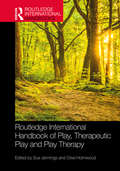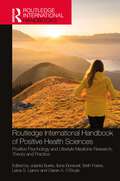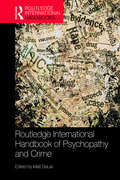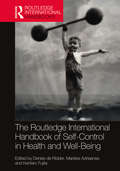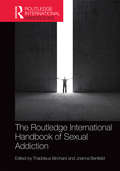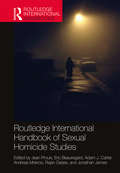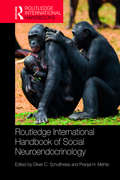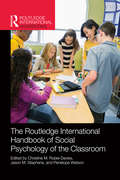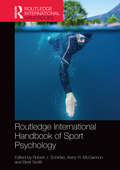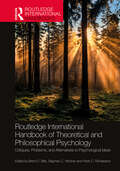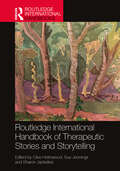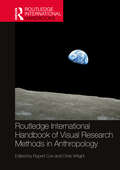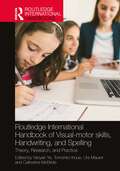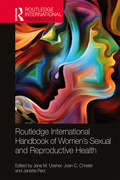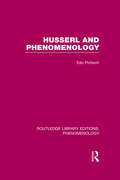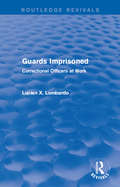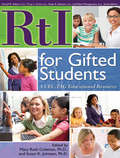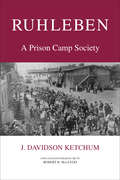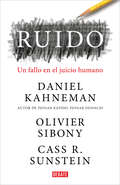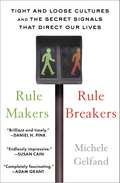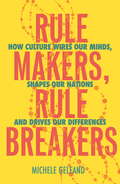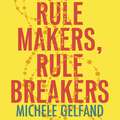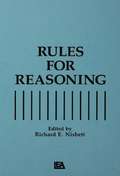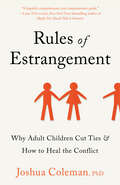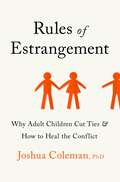- Table View
- List View
Routledge International Handbook of Play, Therapeutic Play and Play Therapy (Routledge International Handbooks)
by Sue Jennings Clive HolmwoodThe Routledge International Handbook of Play, Therapeutic Play and Play Therapy is the first book of its kind to provide an overview of key aspects of play and play therapy, considering play on a continuum from generic aspects through to more specific applied and therapeutic techniques and as a stand-alone discipline. Presented in four parts, the book provides a unique overview of, and ascribes equal value to, the fields of play, therapeutic play, play in therapy and play therapy. Chapters by academics, play practitioners, counsellors, arts therapists and play therapists from countries as diverse as Japan, Cameroon, India, the Czech Republic, Israel, USA, Ireland, Turkey, Greece and the UK explore areas of each topic, drawing links and alliances between each. The book includes complex case studies with children, adolescents and adults in therapy with arts and play therapists, research with children on play, work in schools, outdoor play and play therapy, animal-assisted play therapy, work with street children and play in therapeutic communities around the world. The Routledge International Handbook of Play, Therapeutic Play and Play Therapy demonstrates the centrality of play in human development, reminds us of the creative power of play and offers new and innovative applications of research and practical technique. It will be of great interest to academics and students of play, play therapy, child development, education and the therapeutic arts. It will also be a key text for play and creative arts therapists, both in practice and in training, play practitioners, social workers, teachers and anyone working with children.
Routledge International Handbook of Positive Health Sciences: Positive Psychology and Lifestyle Medicine Research, Theory and Practice (Routledge International Handbooks)
by Ilona Boniwell Jolanta Burke Beth Frates Ciaran A. O’Boyle Liana S. LianovThis ground-breaking book combines research and practice in the rapidly growing field of Positive Psychology with the fastest-growing medical speciality of Lifestyle Medicine. Section 1 maps out the new field of positive health by exploring the scope, content and architecture of this rapidly emerging area of research. It explores research findings and applications derived from Lifestyle Medicine and Positive Psychology that are critical for positive health. Section 2 delves into positive health research, covering topics such as using character strengths to improve health, maximising psychological wellbeing from head to toe, optimising gut health and understanding the relationships between mind and body. Section 3 offers guidance on applying the principles of positive health by describing new Positive Health Interventions (PHIs), introducing innovative positive health coaching models and exploring the contribution of positive psychology to health equity. The book is ideal for medical doctors, nurses and health professionals interested in helping their patients flourish psychologically and physically. It is an invaluable guide for social workers, positive psychologists, coaches and mental health professionals who want to explore the physiological dimensions of wellbeing.
Routledge International Handbook of Psychopathy and Crime (Routledge International Handbooks)
by Matt DeLisiFor over two centuries, psychopathy has stood as perhaps the most formidable risk factor for antisocial behavior, crime, and violence. The Routledge International Handbook of Psychopathy and Crime presents the state-of-the-art on the full landscape of research on antisocial behavior that employs psychopathy as a central correlate. It is the largest and most comprehensive work of its kind, and includes contributions from renowned scholars from around the world. Organized into five distinctive sections, this book covers the etiology of psychopathy; the measurement of psychopathy; the association between psychopathy and diverse forms of homicidal and sexual offending, including serial murder, sexual homicide, rape and child molestation; criminal careers and psychopathy; the role of psychopathy in criminal justice system supervision, including institutional misconduct, noncompliance, and recidivism. This book is an essential resource for students and researchers in criminology, psychology, and criminal justice and will be of interested to all those interested in criminal behavior, sexual and violent crime, forensic psychology and forensic mental health.
Routledge International Handbook of Self-Control in Health and Well-Being (Routledge International Handbooks)
by Denise De Ridder Marieke Adriaanse Kentaro FujitaThe ability to prioritise long-term goals above short-term gratifications is crucial to living a healthy and happy life. We are bombarded with temptations, whether from fast-food or faster technologies, but the psychological capacity to manage our lives within such a challenging environment has far-reaching implications for the well-being not only of the individual, but also society as a whole. The Routledge International Handbook of Self-Control in Health and Wellbeing is the first comprehensive handbook to map this burgeoning area of research by applying it to health outcomes and personal well-being. Including contributions from leading scholars worldwide, the book incorporates new research findings that suggest that simply inhibiting our immediate impulses isn’t the whole story; there may be more options to improve self-control than simply by suppressing the ego. Divided into six coherent sections, the book provides an overview of the research base before discussing a range of interventions to help improve self-control in different contexts, from smoking or drinking too much to developing self-control over aggression or spending money. The only definitive handbook on this far-reaching topic, this essential work will appeal to researchers and students across health and social psychology, as well as related health sciences.
Routledge International Handbook of Sexual Addiction (Routledge International Handbooks)
by Thaddeus Birchard Joanna BenfieldThe concept of sexual addiction has gained increasing recognition in the academic and healthcare communities since the 1990s. It has also captured the attention of the media, where there has been much debate over whether it can truly be described as an addiction. What is certain is that many people struggle with out of control sexual behaviour, which takes over their lives and has harmful consequences for their relationships, careers and finances. The Routledge International Handbook of Sexual Addiction brings together a comprehensive range of perspectives on sexual addiction from a worldwide selection of scholars and therapists. It sets out to define sexual addiction and to study its causes from a range of different psychological perspectives. A series of presentations of sexual addiction are outlined, including internet sexual addiction and the relationship between paraphilias and sex addiction. The handbook considers both individual and group treatment strategies, drawing on a wide range of approaches, including cognitive behavioural therapy, mindfulness and 12-step programmes. The book studies sex addiction in specific populations including women, adolescents and men who have sex with men. Finally, it considers some of the alternative discourses surrounding the concept of sexual addiction. This is the first comprehensive reference book to bring together global viewpoints on advances in research, theory and practice in one volume. This handbook provides an essential guide for academics and students of psychotherapy, counselling, nursing, addiction, sexualities, social work and health and social care, as well as professionals in practice and in training working with sexual addiction and related issues.
Routledge International Handbook of Sexual Homicide Studies (Routledge International Handbooks)
by Jean Proulx Eric Beauregard Adam J. Carter Andreas Mokros Rajan Darjee Jonathan JamesThis book provides the first systematic overview of the theoretical, empirical, clinical, and police issues related to sexual murderers and murder. Bringing together leading researchers, theoreticians, and practitioners from across eight different countries, this is a truly international collaboration and an essential reference text for students, researchers, and professionals interested in sexual homicide, as well as an exhaustive source of guidelines for the assessment and treatment of sexual murderers. This book is divided into five parts: Part I, Theories and research, presents a detailed review of theoretical models and empirical studies of sexual homicide. Part II, Sexual sadism, discusses theoretical, empirical, and clinical considerations and reviews the literature on the characteristics of sadistic sexual aggressors. Part III, Clinical issues, discusses the assessment and management of sexual murderers at each phase of the judicial process: at trial, during incarceration, and during follow-up in the community. Part IV, Policing issues, discusses research and practical issues related to police activities surrounding a sexual murder. Topics include investigation, offender and geographical profiling, behavioural linkage, and police interrogation of the murderers. Part V, New directions, presents new directions for the study of sexual homicide and discusses the limits of current knowledge related to sexual murderers and their crimes. Offering a broad and comprehensive approach, this Handbook is an indispensable source of information on theory, research, clinical assessment, treatment, and police issues related to sexual murderers and murder.
Routledge International Handbook of Social Neuroendocrinology (Routledge International Handbooks)
by Oliver C. Schultheiss Pranjal H. MehtaThe Routledge International Handbook of Social Neuroendocrinology is an authoritative reference work providing a balanced overview of current scholarship spanning the full breadth of the rapidly developing field of social neuroendocrinology. Considering the relationships between hormones, the brain, and social behavior, this collection brings together groundbreaking research in the field for the first time. <P><P> Featuring 39 chapters written by leading researchers, the handbook offers impressive breadth of coverage. It begins with an overview of the history of social neuroendocrinology before discussing its methodological foundations and challenges. Other topics covered include state-of-the-art research on dominance and aggression; social affiliation; reproduction and pair bonding (e.g., sexual behavior, sexual orientation, romantic relationships); pregnancy and parenting; stress and emotion; cognition and decision making; social development; and mental and physical health. The handbook adopts a lifespan approach to the study of social neuroendocrinology throughout, covering the role that hormones play during gestation, childhood, adolescence, and adulthood. It also illustrates the evolutionary forces that have shaped hormone-behavior associations across species, including research on humans, non-human primates, birds, and rodents. <P><P> The handbook will serve as an authoritative reference work for researchers, students, and others intrigued by this topic, while also inspiring new lines of research on interactions among hormones, brain, and behavior in social contexts.
Routledge International Handbook of Social Psychology of the Classroom (Routledge International Handbooks)
by Christine M. Rubie-Davies Jason M. Stephens Penelope WatsonThe Routledge International Handbook of Social Psychology of the Classroom presents the first comprehensive and integrated compilation of theory and research on topics related to the social cohesion of the classroom. Many of these topics have been studied independently; for example, motivation, self-concept, class management, class climate, and teacher expectations are generally studied separately by different groups of researchers. This handbook brings the evidence from different fields in social psychological classroom research together in one place for the first time to explore how these topics relate and how each factor influences students and their learning. With chapters by established international leaders in their fields, as well as emerging new talent, this handbook offers cutting edge research and surveys the state of the art in the social psychology of the classroom. Major areas covered include: Motivation Belief, self-concept, and personality Emotional engagement Teacher–student relationships Teacher expectation Classroom management Culture and identity The Routledge International Handbook of Social Psychology of the Classroom provides a review of current theories related to the social psychology of the classroom, including how these theories apply to classrooms and learners. Current evidence clearly shows that areas explored by social psychology – and brought together for the first time in this volume – can have a very significant impact on classroom learning and student achievement (J. Hattie, Visible Learning: A Synthesis of over 800 Meta-Analyses Relating to Achievement, Routledge 2009). This handbook is a must for all academics whose research relates to the social psychology of the classroom. It is also an invaluable resource for teachers and teacher education students who want to understand why they are effective instructors and yet still encounter students in their classes who are not responding as expected.
Routledge International Handbook of Sport Psychology (Routledge International Handbooks)
by Robert J. Schinke, Kerry R, McGannon and Brett SmithContemporary sport psychology is a rapidly developing and theoretically rich discipline, and a sophisticated and challenging profession. The Routledge International Handbook of Sport Psychology offers a comprehensive and authoritative guide to contemporary sport psychology in all its aspects. Written by a team of world-leading researchers and practitioners from five continents, including both established scholars and the best emerging talents, the book traces the contours of the discipline of sport psychology, introducing fundamental theory, discussing key issues in applied practice, and exploring the most important themes, topics and debates across the sport psychology curriculum. Uniquely, the book presents comparative studies of the history and contemporary practice of sport psychology in ten countries, including the US, UK, China, Japan, Brazil, Russia and Israel, helping the reader to understand the cultural and contextual factors that shape international practice in sport psychology. As well as covering in depth the core pillars of sport psychology, from motivation and cognition to group dynamics, the book also includes a full section on cultural sport psychology, a vital but under-explored sub-discipline that is having a profound influence on contemporary theory and practice. With 56 chapters and unparalleled range, depth and currency, the Routledge Handbook of International Sport Psychology is an essential addition to any library with a serious holding in sport psychology.
Routledge International Handbook of Theoretical and Philosophical Psychology: Critiques, Problems, and Alternatives to Psychological Ideas (Routledge International Handbooks)
by Brent D. Slife Stephen C. Yanchar Frank C. RichardsonRoutledge International Handbook of Theoretical and Philosophical Psychology is a compilation of works by leading scholars in theoretical and philosophical psychology that offers critical analyses of, and alternatives to, current theories and philosophies typically taken for granted in mainstream psychology. Within their chapters, the expert authors briefly describe accepted theories and philosophies before explaining their problems and exploring fresh, new ideas for practice and research. These alternative ideas offer thought-provoking ways of reinterpreting many aspects of human existence often studied by psychologists. Organized into five sections, the volume covers the discipline of psychology in general, various subdisciplines (e.g., positive psychology and human development), concepts of self and identity as well as research and practice. Together the chapters present a set of alternative ideas that have the potential to take the field of psychology in fruitful directions not anticipated in more traditional theory and research. This handbook will be a valuable resource for students and scholars of the theory, assumptions, and history of psychology.
Routledge International Handbook of Therapeutic Stories and Storytelling (Routledge International Handbooks)
by Clive HolmwoodThe Routledge International Handbook of Therapeutic Stories and Storytelling is a unique book that explores stories from an educational, community, social, health, therapeutic and therapy perspectives, acknowledging a range of diverse social and cultural views in which stories are used and written by esteemed storytellers, artists, therapists and academics from around the globe. The book is divided into five main sections that examine different approaches and contexts for therapeutic stories and storytelling. The collected authors explore storytelling as a response to the Covid-19 pandemic, in education, social and community settings, and in health and therapeutic contexts. The final section offers an International Story Anthology written by co-editor Sharon Jacksties and a final story by Katja Gorečan. This book is of enormous importance to psychotherapists and related mental health professionals, as well as academics, storytellers, teachers, people working in special educational needs, and all those with an interest in storytelling and its applied value.
Routledge International Handbook of Visual Research Methods in Anthropology
by Chris Wright Rupert CoxRoutledge International Handbook of Visual Research Methods in Anthropology approaches the question of method through conceptualisations of the visual world as light, sight, images and technologies of imaging that can be analysed and described through a range of visual practices in the course of anthropological research.The aim of the book is to move beyond making a case for the importance of “the visual” via its notional arrangement as a subject and means of study in anthropology by showing how it is applied as a way of doing anthropological research through the explication of a series of examples. Employing an innovative structure for a handbook, each contribution is orientated around a single distinguishing concept and together the contributions addresses the following three issues: How to see through images by treating the visual as a form of knowledge made visible. A second group of entries is concerned with how to see through time by approaching the visual as a modality for representing duration and rendering legible what may no longer be available to vision. Finally, a third group of entries deals with the visual at a phenomenal level, as a medium that we see in.This handbook is a timely and useful resource for both students and researchers of anthropology at this time because the discipline's long-standing, theoretical and empirically rich practical engagements with visual methods provide valuable insights for the social sciences into current transmutations of “the visual” into “the multimodal”, the “non-representational” and “the sensory”. The importance of these areas as well as of digital research more generally makes visual methods ever more important for social scientists; hence, this handbook is also valuable for those studying general research methods courses and in related fields such as sociology, health studies and social work.
Routledge International Handbook of Visual-motor skills, Handwriting, and Spelling: Theory, Research, and Practice (Routledge International Handbooks)
by Catherine McBride Yanyan Ye Tomohiro Inoue Urs MaurerThe Routledge International Handbook of Visual-motor skills, Handwriting, and Spelling explores the potentially controversial field of early literacy education. It aims to offer scholars and practitioners an analysis of how and why handwriting skills benefit early literacy learning, especially spelling acquisition, and how this can enrich experiences for children and educators. Offering global perspectives from the field, the volume integrates current theories with up-to-date research and practice, revealing how we can best support children’s early literacy learning with handwriting and visual-motor skills interventions. Key topics covered include: The fundamentals of handwriting skills and literacy acquisition; Global literacy and spelling; Dysgraphia, handwriting difficulties, and dyslexia; Spelling and writing in the digital age; Home learning environment and spelling; Instruction and interventions for spelling and writing. This comprehensive survey will be essential reading for scholars and students of developmental psychology, education, and literacy research.
Routledge International Handbook of Women's Sexual and Reproductive Health (Routledge International Handbooks)
by Joan C. Chrisler Jane M. Ussher Janette PerzThe Routledge International Handbook of Women’s Sexual and Reproductive Health is the authoritative reference work on important, leading-edge developments in the domains of women’s sexual and reproductive health. The handbook adopts a life-cycle approach to examine key milestones and events in women’s sexual and reproductive health. Contributors drawn from a range of disciplines, including psychology, medicine, nursing and midwifery, sociology, public health, women’s studies, and indigenous studies, explore issues through three main lenses: the biopsychosocial model feminist perspectives international, multidisciplinary perspectives that acknowledge the intersection of identities in women’s lives. The handbook presents an authoritative review of the field, with a focus on state-of-the-art work, encouraging future research and policy development in women’s sexual and reproductive health. Finally, the handbook will inform health care providers about the latest research and clinical developments, including women’s experiences of both normal and abnormal sexual and reproductive functions. Drawing upon international expertise from leading academics and clinicians in the field, this is essential reading for scholars and students interested in women’s reproductive health.
Routledge Library Editions: Phenomenology (Routledge Library Editions: Phenomenology)
by VariousReissuing works originally published between 1970 and 1995, Routledge Library Editions: Phenomenology (14 volume set) offers a selection of scholarship covering this important branch of philosophy and method. Volumes cover theories of Husserl and Heidegger, and branch out to such topics as psychology, Marxism, language and emotion, and education, forming a varied and informative collection of previously out-of-print works.
Routledge Revivals (1989): Correctional Officers at Work
by Lucien X. LombardoFirst published in 1989, Guards Imprisoned provides an in-depth look into the work and working life of prison guards as they perceive and experience it. The author, who was a teacher at Auburn Prison, New York, discovered that little was known about the guard’s perceptions of his "place" in the prison community and set out to explore the dynamics of this key correctional occupation from the perspective of those who do it. The raw data was provided by over 160 hours of interviews with guards and is presented in the order of a "natural history" — from their prerecruitment images of prison to the search for satisfaction as experienced guards. The book also includes a follow-up with the officers who were originally interviewed in 1976, assessing patterns of change and stability in their attitudes and behaviors. The Auburn Correctional Facility (renamed from Auburn Prison in 1970) was the second state prison in New York, the site of the first execution by electric chair in 1890, and the namesake of the famed "Auburn System" replicated across the country, in which people worked in groups during the day, were housed in solitary confinement at night, and lived in total silence. The facility is celebrating the 200th anniversary of its groundbreaking in 2016.
RtI for Gifted Students: A Cec-tag Educational Resource
by Mary Ruth Coleman Susan K. JohnsenRtI for Gifted Students provides a comprehensive overview of Response to Intervention (RtI) frameworks that include gifted students. One of the books featured in the CEC-TAG Educational Resource series, the book incorporates national, state, and local RtI models and how gifted learners can be included within these frameworks. Specific attention is given to addressing the needs of students who are twice-exceptional and to culturally responsive practices. The book concludes with ways of assessing a school's RtI model and challenges for using RtI in gifted education.
Ruhleben: A Prison Camp Society (Heritage)
by J. Davidson KetchumThis is an unusual book in that it is an important contribution to social psychology and also an absorbing story of four strange years in a German prison camp of World War I. Four thousand men and boys from the most varied walks of life—professors, seamen, jockeys, schoolboys, bank directors, musicians, clerks, scientists—were taken from civilian life and placed in Ruhleben on the outbreak of war; no activities were prescribed for them, no direction was given to their communal life. In the event, this miscellaneous group of people, closed off from the world, create d their own society. This book is the story of how they did it and what the society they made was like; much more than this, the camp provides a gifted and sympathetic social psychologist with a rare opportunity for study and analysis of an important if inadvertent social experiment. The time elapsed between the event itself and the completion of the book may in one way be regretted; it did, however, allow the author, who was himself and inmate of Ruhleben, the opportunity for mature reflection on its meaning. The book is a contribution to the history of World War I; it is also a basic and timeless study of the dynamics of individual and group behaviour.
Ruido: Un fallo en el juicio humano
by Cass R. Sunstein Daniel Kahneman Olivier SibonyPARA ENTENDER CÓMO PENSAMOS Y PENSAR MEJOR, HAY QUE LEER A KAHNEMAN Premio Nobel de Economía Dos médicos en la misma ciudad pueden dar diagnósticos diferentes a pacientes idénticos; dos jueces pueden dictar sentencias distintas ante delitos similares; nosotros mismos podemos decidir una cosa u otra según sea por la mañana o por la tarde, o según se acerque o no la hora de comer. Estos son ejemplos de ruido: el sesgo que conlleva variabilidad en juicios que deberían ser iguales. El ruido está presente en todas las decisiones individuales y colectivas, y produce errores en innumerables terrenos, desde la medicina hasta la economía, pasando por el derecho, la sanidad, la protección infantil y la contratación. Además, también nos importuna e influye a la hora de tomar muchas de nuestras decisiones cotidianas. Daniel Kahneman, uno de los psicólogos más importantes del mundo, junto con Cass R. Sunstein y Olivier Sibony, dos eminencias mundiales en pensamiento estratégico, nos enseñan a escuchar ese ruido, cuyo impacto tendemos a ignorar, y a reducirlo para mejorar nuestros juicios. Basado en el mismo tipo de análisis agudo e ingeniosos ejemplos que convirtió Pensar rápido, pensar despacio en un best seller internacional, Ruido ofrece una serie de remedios originales, prácticos y sencillos para pensar mejor. La crítica ha dicho:«Una investigación absolutamente brillante de un problema social inmenso que nos ha pasado desapercibido cuando ha estado siempre ante nuestros ojos.»Steven Levitt, autor de Freakonomics «Monumental y apasionante. Excepcional.»The Sunday Times «Un tour de force de sabiduría y claridad.»The New York Times «Puede que Ruido sea el libro más importante que he leído en más de una década. Una obra maestra.»Angela Duckworth, autora de Grit «Un logro magistral y un hito en el campo de la psicología.»Philip E. Tetlock, coautor de Superpronosticadores «Una exploración electrizante de la mente humana. Este libro cambiará permanentemente nuestra forma de pensar sobre la escala y el alcance de los prejuicios.»David Lammy, diputado por Tottenham «Prepárate para que algunas de las mentes más brillantes del mundo te ayuden a repensar tu forma de evaluar a las personas, tomar decisiones y resolver problemas.»Adam Grant, autor de Think Again y presentador del TED podcast WorkLife
Rule Makers, Rule Breakers: How Tight and Loose Cultures Wire Our World
by Michele GelfandA celebrated social psychologist offers a radical new perspective on cultural differences that reveals why some countries, cultures, and individuals take rules more seriously and how following the rules influences the way we think and act.In Rule Makers, Rule Breakers, Michele Gelfand, &“an engaging writer with intellectual range&” (The New York Times Book Review), takes us on an epic journey through human cultures, offering a startling new view of the world and ourselves. With a mix of brilliantly conceived studies and surprising on-the-ground discoveries, she shows that much of the diversity in the way we think and act derives from a key difference—how tightly or loosely we adhere to social norms. Just as DNA affects everything from eye color to height, our tight-loose social coding influences much of what we do. Why are clocks in Germany so accurate while those in Brazil are frequently wrong? Why do New Zealand&’s women have the highest number of sexual partners? Why are red and blue states really so divided? Why was the Daimler-Chrysler merger ill-fated from the start? Why is the driver of a Jaguar more likely to run a red light than the driver of a plumber&’s van? Why does one spouse prize running a tight ship while the other refuses to sweat the small stuff? In search of a common answer, Gelfand spent two decades conducting research in more than fifty countries. Across all age groups, family variations, social classes, businesses, states, and nationalities, she has identified a primal pattern that can trigger cooperation or conflict. Her fascinating conclusion: behavior is highly influenced by the perception of threat. &“A useful and engaging take on human behavior&” (Kirkus Reviews) with an approach that is consistently riveting, Rule Makers, Ruler Breakers thrusts many of the puzzling attitudes and actions we observe into sudden and surprising clarity.
Rule Makers, Rule Breakers: Tight and Loose Cultures and the Secret Signals That Direct Our Lives
by Michele J. Gelfand'A groundbreaking analysis of what used to be an impenetrable mystery: how and why do cultures differ? ... Anyone interested in our cultural divides will find tremendous insight in Rule Makers, Rule Breakers' - Steven Pinker, Johnstone Professor of Psychology, Harvard University, and author of Enlightenment NowWhy are clocks in Germany always correct, while those in Brazil are frequently wrong? Why are Singaporeans jailed for selling gum? Why do women in New Zealand have three times the sex of females worldwide? Why was the Daimler-Chrysler merger ill-fated from the start? And why does each generation of Americans give their kids weirder and weirder names? Curious about the answers to these and other questions, award-winning social psychologist Michele Gelfand has spent two decades studying both tight societies (with clearly stated rules and codes of ethics) and loose societies (more informal communities with weak or ambiguous norms). Putting each under the microscope, she conducted research in more than fifty countries and collaborated with political scientists, neuroscientists, computer scientists, anthropologists, and archaeologists. Her fascinating conclusion: behaviour seems largely dependent on perceived threats. It's why certain nations seem predisposed to tangle with others; some American states identify as "Red" and others as "Blue"; and those attending a sports contest, health club, or school function behave in prescribed ways. Rule Makers, Rule Breakers reveals how to predict national variations around the globe, why some leaders innovate and others don't, and even how a tight vs. loose system can determine happiness. Consistently riveting and always illuminating, Michele Gelfand's book helps us understand how a single cultural trait dramatically affects even the smallest aspects of our lives.'Fascinating and profound...It's quite possibly this year's best book on culture' - Roy F. Baumeister, bestselling co-author of Willpower and author of The Cultural Animal'This brilliant book is full of well-documented insights that will change the way you look at yourself and at the world around you' - Barry Schwartz, bestselling author of The Paradox of Choice, Practical Wisdom, and Why We Work
Rule Makers, Rule Breakers: Tight and Loose Cultures and the Secret Signals That Direct Our Lives
by Michele J. Gelfand'A groundbreaking analysis of what used to be an impenetrable mystery: how and why do cultures differ? ... Anyone interested in our cultural divides will find tremendous insight in Rule Makers, Rule Breakers' - Steven Pinker, Johnstone Professor of Psychology, Harvard University, and author of Enlightenment NowWhy are clocks in Germany always correct, while those in Brazil are frequently wrong? Why are Singaporeans jailed for selling gum? Why do women in New Zealand have three times the sex of females worldwide? Why was the Daimler-Chrysler merger ill-fated from the start? And why does each generation of Americans give their kids weirder and weirder names? Curious about the answers to these and other questions, award-winning social psychologist Michele Gelfand has spent two decades studying both tight societies (with clearly stated rules and codes of ethics) and loose societies (more informal communities with weak or ambiguous norms). Putting each under the microscope, she conducted research in more than fifty countries and collaborated with political scientists, neuroscientists, computer scientists, anthropologists, and archaeologists. Her fascinating conclusion: behaviour seems largely dependent on perceived threats. It's why certain nations seem predisposed to tangle with others; some American states identify as "Red" and others as "Blue"; and those attending a sports contest, health club, or school function behave in prescribed ways. Rule Makers, Rule Breakers reveals how to predict national variations around the globe, why some leaders innovate and others don't, and even how a tight vs. loose system can determine happiness. Consistently riveting and always illuminating, Michele Gelfand's book helps us understand how a single cultural trait dramatically affects even the smallest aspects of our lives.'Fascinating and profound...It's quite possibly this year's best book on culture' - Roy F. Baumeister, bestselling co-author of Willpower and author of The Cultural Animal'This brilliant book is full of well-documented insights that will change the way you look at yourself and at the world around you' - Barry Schwartz, bestselling author of The Paradox of Choice, Practical Wisdom, and Why We Work
Rules for Reasoning
by Richard E. NisbettThis book examines two questions: Do people make use of abstract rules such as logical and statistical rules when making inferences in everyday life? Can such abstract rules be changed by training? Contrary to the spirit of reductionist theories from behaviorism to connectionism, there is ample evidence that people do make use of abstract rules of inference -- including rules of logic, statistics, causal deduction, and cost-benefit analysis. Such rules, moreover, are easily alterable by instruction as it occurs in classrooms and in brief laboratory training sessions. The fact that purely formal training can alter them and that those taught in one content domain can "escape" to a quite different domain for which they are also highly applicable shows that the rules are highly abstract. The major implication for cognitive science is that people are capable of operating with abstract rules even for concrete, mundane tasks; therefore, any realistic model of human inferential capacity must reflect this fact. The major implication for education is that people can be far more broadly influenced by training than is generally supposed. At high levels of formality and abstraction, relatively brief training can alter the nature of problem-solving for an infinite number of content domains.
Rules of Estrangement: Why Adult Children Cut Ties and How to Heal the Conflict
by Joshua ColemanA guide for parents whose adult children have cut off contact that reveals the hidden logic of estrangement, explores its cultural causes, and offers practical advice for parents trying to reestablish contact with their adult children.&“Finally, here&’s a hopeful, comprehensive, and compassionate guide to navigating one of the most painful experiences for parents and their adult children alike.&”—Lori Gottlieb, psychotherapist and New York Times bestselling author of Maybe You Should Talk to SomeoneLabeled a silent epidemic by a growing number of therapists and researchers, estrangement is one of the most disorienting and painful experiences of a parent's life. Popular opinion typically tells a one-sided story of parents who got what they deserved or overly entitled adult children who wrongly blame their parents. However, the reasons for estrangement are far more complex and varied. As a result of rising rates of individualism, an increasing cultural emphasis on happiness, growing economic insecurity, and a historically recent perception that parents are obstacles to personal growth, many parents find themselves forever shut out of the lives of their adult children and grandchildren. As a trusted psychologist whose own daughter cut off contact for several years and eventually reconciled, Dr. Joshua Coleman is uniquely qualified to guide parents in navigating these fraught interactions. He helps to alleviate the ongoing feelings of shame, hurt, guilt, and sorrow that commonly attend these dynamics. By placing estrangement into a cultural context, Dr. Coleman helps parents better understand the mindset of their adult children and teaches them how to implement the strategies for reconciliation and healing that he has seen work in his forty years of practice. Rules of Estrangement gives parents the language and the emotional tools to engage in meaningful conversation with their child, the framework to cultivate a healthy relationship moving forward, and the ability to move on if reconciliation is no longer possible.While estrangement is a complex and tender topic, Dr. Coleman's insightful approach is based on empathy and understanding for both the parent and the adult child.
Rules of Estrangement: Why Adult Children Cut Ties and How to Heal the Conflict
by Joshua Coleman'I've seen many parents and adult children grappling with these issues, and this is exactly the book they have all been waiting for.' - Lori GottliebHas your adult child cut off contact with you? How can you heal the pain and start to build a bridge back to them?Labelled a silent epidemic by a growing number of therapists and researchers, estrangement is one of the most disorienting and painful experiences of a parent's life. Popular opinion typically tells a one-sided story of parents who got what they deserved or overly entitled adult children who wrongly blame their parents. However, the reasons for alienation are far more complex and varied. As a result of rising rates of individualism, an increasing cultural emphasis on happiness, growing economic insecurity, and a historically recent perception that parents are obstacles to personal growth, many parents find themselves forever shut out of the lives of their adult children and grandchildren.As a trusted psychologist whose own daughter cut off contact for several years and eventually reconciled, Dr Joshua Coleman is uniquely qualified to guide parents in navigating these fraught interactions. He helps to alleviate the ongoing feelings of shame, hurt, guilt, and sorrow that commonly attend these dynamics. By placing estrangement into a cultural context, Dr Coleman helps parents better understand the mindset of their adult children and teaches them how to implement the strategies for reconciliation and healing that he has seen work in his forty years of practice. Rules of Estrangement gives parents the language and the emotional tools to engage in meaningful conversation with their child, the framework to cultivate a healthy relationship moving forward, and the ability to move on if reconciliation is no longer possible.While estrangement is a complex and tender topic, Dr Coleman's insightful approach is based on empathy and understanding for both the parent and the adult child.
